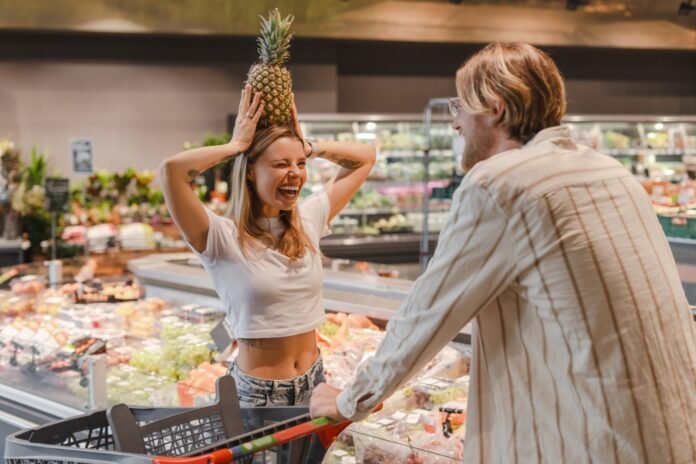Spanish youths are taking a new approach to finding love, and it doesn’t involve dating apps. Instead, they’re heading to grocery stores, armed with an upside-down pineapple. The fruit has become a quirky symbol, a subtle sign that someone is single and open to meeting new people. TikTok has made this trend go viral, with young Spaniards flocking to the fruit section to show their availability. It’s a fresh alternative to the more traditional ways of meeting potential partners, and it’s sparking interest across the country.
Instead of the swipe-left or swipe-right culture of dating apps, this trend brings social interaction back into the physical world, offering a simple but playful way for people to connect. When someone spots an upside-down pineapple in a shopping basket, it signals a clear invitation to strike up a conversation. It’s an old-school method mixed with a bit of modern flair, allowing singles to express their openness to romance without the awkwardness of a direct approach.
The upside-down pineapple trend has become popular partly because it offers a solution to a problem many face in the dating world: ambiguity. Dating apps are full of uncertainty, and the lack of face-to-face interaction often leads to misunderstandings. But with a visible sign like the upside-down pineapple, there’s no mistaking someone’s intention. The clarity it provides takes away some of the pressure and awkwardness, making it easier for people to engage in conversations that could lead to a romantic connection.
Experts believe this trend reflects a broader shift in dating culture. As society becomes more digitally oriented, the way people approach romance has evolved. Aashmeen Munjaal, an ontologist and mental health expert, sees a connection between this real-world trend and the behaviors people exhibit online. “We’re used to showing interest with likes or follows on social media. The upside-down pineapple is just a physical version of that,” she explains. The trend plays on the idea of indirect communication, something many people are more comfortable with in a digital world.
Fear of rejection also plays a significant role in this phenomenon. For many, the thought of directly approaching someone in public can be intimidating. Munjaal points out that indirect methods, like the upside-down pineapple, provide a sense of security. “People want to test the waters without exposing themselves to the full risk of rejection,” she says. By using this symbol, individuals can signal their interest in a way that feels safe and low-risk, reducing the anxiety that often comes with putting oneself out there.
This trend may also be a response to the fatigue people feel with dating apps. As the novelty of swiping fades, individuals are searching for more meaningful and creative ways to meet potential partners. The grocery store setting adds an element of spontaneity, which many feel is missing from the online dating experience. There’s something refreshing about meeting someone in person, in a casual and unexpected environment, compared to the often superficial interactions on apps.
What’s more, this trend highlights a desire for fun and playfulness in the dating world. The upside-down pineapple is a lighthearted way to signal interest, bringing an element of joy back into the process of finding love. It allows people to break away from the seriousness and pressure often associated with dating, creating a more relaxed and enjoyable atmosphere.
As the trend gains momentum, it’s clear that people are looking for new ways to make connections in a world where digital interaction has become the norm. Whether it’s the simplicity of the symbol or the excitement of trying something different, the upside-down pineapple trend is reshaping the dating scene in Spain. It’s a creative, non-verbal way of expressing interest, and it seems to be working for many young Spaniards eager to meet someone new.
The upside-down pineapple may just be a fruit, but in this context, it represents something more: a new beginning, a playful chance at love, and a sign that dating doesn’t have to be complicated. It’s proof that in a world full of apps and algorithms, sometimes the simplest gestures can make the biggest impact.
The growing popularity of the upside-down pineapple trend highlights the playful side of dating culture. It offers people a way to express interest without the pressures of swiping right or left on a screen. Many find this approach refreshing because it feels more organic and spontaneous. Instead of relying on algorithms or curated profiles, individuals can engage in a lighthearted, real-world experience.
Beyond the fun, this trend taps into a deeper need for human connection. Social media and dating apps have often been criticized for creating shallow relationships, and many young Spaniards are seeking more genuine encounters. The supermarket setting, a place most people visit weekly, provides a casual yet effective environment for meeting potential partners. No need for fancy outfits or rehearsed introductions — just a simple pineapple to spark interest.
Relationship experts also point out that this trend is a reaction to the overstimulation of online dating. Constant notifications, conversations that go nowhere, and the often superficial nature of dating apps have left many feeling fatigued. The upside-down pineapple trend offers a reprieve from these frustrations by making the dating game fun again, while still offering a safe and non-invasive way to show interest.

